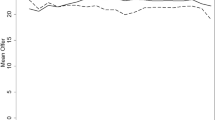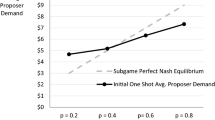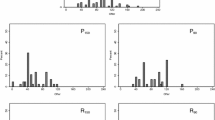Abstract
While fairness is often mentioned as a determinant of ultimatum bargaining behavior, few data sets are available that can test theories that incorporate fairness considerations. This paper tests the reciprocal kindness theory in Rabin (1993 Incorporating fairness into game theory and economics, The American Economic Review 83: 1281-1302) as an application to the one-period ultimatum bargaining game. We report on data from 100 ultimatum games that vary the financial stakes of the game from $1 to $15. Responder behavior is strongly in support of the kindness theory and proposer behavior weakly in support of it. Offer percentages and past offers influence behavior the most, whereas the size of the pie has a marginally significant effect on offer percentages. The data is more in support of reciprocal kindness than alternative theories of equal-split or learning behavior, although the data also weakly support a minimum percentage threshold hypothesis. As a whole, our results together with existing studies suggest that, for smaller stakes games, fairness considerations dominate monetary considerations. This has implications for more complicated naturally occurring bargaining environments in which the financial stakes can vary widely.
Similar content being viewed by others
REFERENCES
Berg, J., Dickhaut, J. and McCabe, K.: (1995), Trust, reciprocity, and social history, Games and Economic Behavior 10: 122–142.
Bolton, G.: (1991), A comparative model of bargaining: theory and evidence, American Economic Review 81: 1096–1136.
Brandts, J. and Schram, A.: (1996), Cooperative gains or noise in public goods experiments: applying the contribution function approach. Tinbergen Institute: Experimental, Behavioural and Political Economics, Working paper.
Cameron, L.: (1995), Raising The Stakes in the ultimatum game: Experimental evidence from Indonesia, Working Paper, Princeton University, Industrial relations section.
Cox, J.: (1997), On testing the utility hypothesis, Economic Journal 107(443): 1054–1089.
Croson, R.: (1996), Information in ultimatum games: an experimental study, Journal of Economic Behavior and Organization 30: 197–213.
Fehr, E. and Tougareva, E.: (1995), Do competitive markets with high stakes remove reciprocal fairness? Experimental evidence from Russia. Working paper (mimeo).
Forsythe, R., Horowitz, J., Savin, N. and Sefton, M.: (1994), Fairness in simple bargaining experiments, Games and Economic Behavior 6: 347–369.
Geanakoplos, J., Pearce, D. and Stacchetti, E.: (1989), Psychological games and sequential rationality, Games and Economic Behavior 1: 60–79.
Guth, W., Schmittberger, R. and Schwarz, B.: (1982), An experimental analysis of ultimatum bargaining, Journal of Economic Behavior and Organization 3: 367–388.
Hoffman, E., McCabe, K. Shachat, K. and Smith, V.: (1992), Preferences, property rights, and anonymity in bargaining games. University of Arizona, Working Paper 92–8.
Ochs, J. and Roth, A.: (1989), An experimental study of sequential bargaining, American Economic Review 79: 355–384.
Rabin, M.: (1993), Incorporating fairness into game theory and economics, The American Economic Review 83: 1281-1302.
Roth, A. and Erev, I.: (1995), Learning in extensive-form games: experimental data and simple dynamicmodels in the intermediate term, Games and Economic Behavior 8: 164–212.
Roth, A. and Malouf, M.: (1979), Game-theoretic models and the role of information in bargaining, Psychological Review 86: 574–594.
Roth, A., Prasnikar, V., Okuno-Fujiwara, M. and Zamir, S.: (1991), Bargaining and market behavior in Jerusalem, Ljubljana, Pittsburgh, and Tokyo: an experiment study, American Economic Review 81: 1068–1095.
Slonim, R. and Roth, A.: (1998), Learning in high stakes ultimatum games: an experiment in the Slovak Republic, Econometrica 66: 569–596.
Straub, P. and Murnighan, K.: (1995), An experimental investigation of ultimatum games: information, fairness, expectations, and lowest acceptable offers, Journal of Economic Behavior and Organization 27: 345–364.
Author information
Authors and Affiliations
Rights and permissions
About this article
Cite this article
Dickinson, D.L. Ultimatum decision-making: A test of reciprocal kindness. Theory and Decision 48, 151–177 (2000). https://doi.org/10.1023/A:1005274316908
Issue Date:
DOI: https://doi.org/10.1023/A:1005274316908




